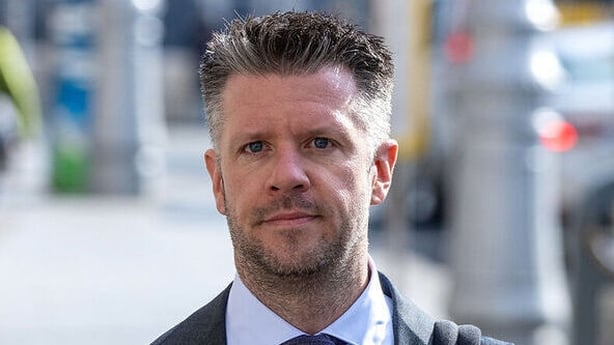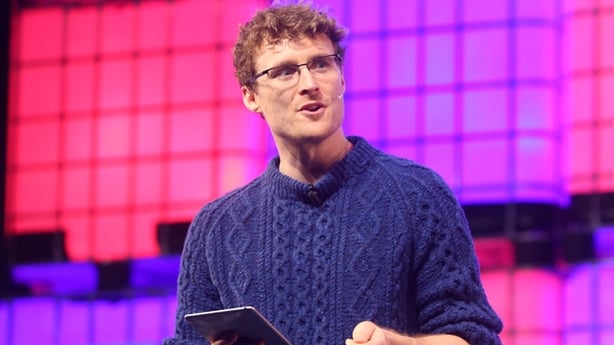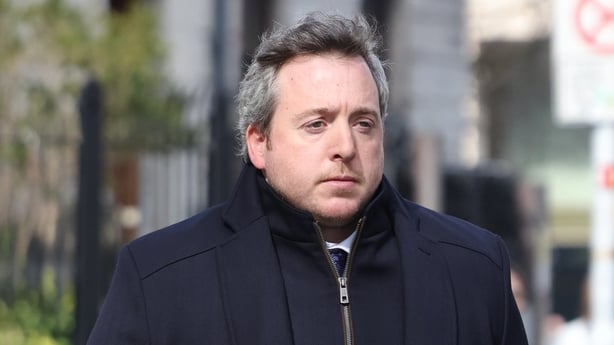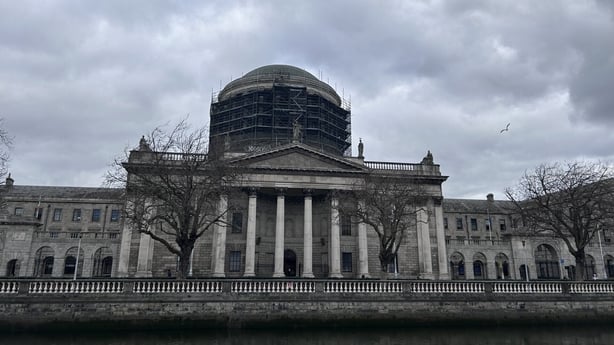Blackmail, bad faith, intimidation, manipulation, oppression. Cheating, swiping, lining your pockets, greed. There was hardly an accusatory word that wasn't used as the much anticipated Web Summit case opened at the High Court on Tuesday.
Senior Counsel Bernand Dunleavy said bitterness was running through the case like a spine, animating every aspect. Parts of it read more like the regrettable aspects of a family law case than what you'd expect to find in the commercial division of the High Court, he said.
The case involves five separate legal actions to be heard over an estimated nine weeks.
Paddy Cosgrave is suing former Web Summit director David Kelly, who holds a 12% stake in the business, for alleged breaches of duties as a director.
He is seeking damages for losses, which he says relate to Mr Kelly's role in the establishment of a venture capital fund separate from Web Summit. Mr Kelly and former director Daire Hickey, who has a 7% shareholding, are suing Mr Cosgrave, alleging shareholder oppression and breach of a profit share agreement.
It wasn't always this way. The court was told how Paddy Cosgrave and David Kelly had been friends since boarding school, later sharing a house at Manders Terrace in Dublin. They worked from their kitchen table in the early days of a company originally named after their shared address.
They were later joined by Daire Hickey, a college friend of Paddy Cosgrave, and the three men worked together as Web Summit flourished and gained worldwide reach.

Fast forward 15 years and the three men who had once shared a boardroom were now on opposite sides of a courtroom. Court 29 is tucked away at the end of a corridor on the top floor of the Four Courts complex. It has a different set up to most other courtrooms. The public gallery is split in two, the tiered seating set slightly back with the view from each side obscuring the other.
From Tuesday to Friday, the allegations emerged - each of the shareholders outlining their case through their respective legal teams. Mr Justice Michael Twomey was told he will also hear direct evidence from all three.
Paddy Cosgrave's lawyers described him as a man with an outsize public profile, the engine of Web Summit always looking to generate new opportunities.
They said Web Summit was uniquely placed to match those with ideas and no money with investors looking for the next best thing. So, it got involved in a venture capital fund overseen by David Kelly.
But when Mr Kelly left Web Summit in 2021, a bitter row broke out. Paddy Cosgrave claims Mr Kelly was in breach of his director's duties by setting up a second investment fund for his own profit.
Bernard Dunleavy, for Mr Cosgrave, said the second fund was a business opportunity for Web Summit worth over €11 million, which was "swiped" from under their nose in a smash and grab by Mr Kelly.
Mr Dunleavy described it as "a case of active deception" by Mr Kelly, who had used an opportunity to roll out a second venture capital fund for his own profit. He said Mr Kelly by virtue of his office had a duty of loyalty and faithfulness to the company, but proved himself to be "disloyal and faithless" and his conduct "flies full square in the face of the established case law in relation to the responsibility that comes with fiduciary duties".
Mr Dunleavy said an email in May 2018 from Mr Kelly to Paddy Cosgrave illustrated that Mr Kelly was "positioning himself to go" while Web Summit was in for the long term.

Mr Dunleavy said this was a completely different rationale to the consistent story put forward in these proceedings by Mr Kelly, that Mr Cosgrave made his experience so stressful and miserable that he was ultimately obliged to leave.
Mr Dunleavy told the court that in correspondence in 2021 about his resignation, Mr Kelly was officially telling Mr Cosgrave that he wanted to "step away from Web Summit and Fund 2" but in a communication with a friend, had said that when Mr Cosgrave had tried to re-negotiate the terms of the second investment, he said "F*** you, I'm going ahead with Fund 2 without you".
Mr Dunleavy said this showed "deep duplicity" on the part of Mr Kelly, who absolutely had not said that to Mr Cosgrave.
An expert report commissioned by Mr Cosgrave's side puts the loss to the Web Summit at over €11 million and the profits made by Mr Kelly at just over €1 million.
Capable of 'sustained ire'
Lawyers for Mr Kelly said the only opportunity for Web Summit was the option to invest in the second fund, which it ultimately did not do, and there was nothing wrong in law with Mr Kelly managing that fund. Senior Counsel Michael Cush said the case was flawed in that respect.
Mr Cush said Mr Cosgrave appeared to thrive on confrontation. But he said the case was not about a clash of personalities, it was one of "egregious oppression" of his client, a minority shareholder.
Mr Cush told the court Mr Cosgrave was "an intense man, extremely hard working and undoubtedly had a talent" but was also capable of "sustained ire towards those he perceived to cross him".
He said Mr Cosgrave had described himself as "having fun" during a period of intense controversy with Mr Kelly who had "suffered terribly as a result".

He said Mr Cosgrave had used a five-year-old complaint of sexual harassment against another former director, Daire Hickey, to invent accusations against Mr Kelly that he had not investigated the complaint properly and had sought to cover it up. Mr Hickey denies any wrongdoing.
On Thursday, the court was told that Mr Cosgrave had suggested years later to Mr Kelly that he had not investigated the complaint properly because Mr Hickey had "kompromat" on Mr Kelly. Mr Cush said Mr Cosgrave had developed and pursued the suggestion relentlessly, but Mr Cush submitted that he had invented it and never really believed it himself.
Details of a text exchange were shown to the court where Mr Kelly questions Mr Cosgrave about what he is talking about. Mr Cosgrave goes on to suggest that Mr Hickey may have visited a brothel while on a business trip to Singapore.
Mr Kelly replies saying they were taken there "by a VC" and did not know where they were going and "nothing happened whatsoever".
Michael Cush said the venue referred to as "Four Floors of Whores" is a nightclub complex over four floors in an office building in Singapore which is a "massive attraction".
The court heard Paddy Cosgrave had recorded a phone call with Mr Kelly during which he accused him of withholding information about the complaint against Mr Hickey. Edited excerpts of the call were then circulated to a number of people by Mr Cosgrave, Mr Cush said.
During the call Mr Kelly repeatedly denied keeping information from Mr Cosgrave, said he was lying and called him "scumbag" for bringing it up. He also accused Mr Cosgrave of manipulating him.
During the call he said: "you're a highly good manipulator, you undermine me, question me, you’ve broken me as a man and a human being. I cried last week."
Mr Cush said the question for the court would be 'was this oppression?' and the answer was most certainly yes.
Hallmarks of a quasi-partnership

Mr Cush said everyone appreciated that Web Summit was Paddy Cosgrave's idea and he was the driving force behind it and that difference was reflected in the difference in their shareholding. But he said it had all the hallmarks of a quasi-partnership based on a long-standing friendship and this was important to counter the arguments that a buy out of a minority shareholding should be at a discounted rate.
Daire Hickey and David Kelly say the value of their shares should not be discounted. Mr Hickey has a 7% shareholding, which his lawyers say is valued at between €19 million and €25 million. They want the court to order Mr Cosgrave to buy out the shareholding as a remedy for oppression and disregard of interests.
Daire Hickey’s lawyers told the court that Paddy Cosgrave engaged in a campaign of intimidation and blackmail to force him out of the company.
They said he dragged up a 2016 complaint of harassment by an employee against Mr Hickey to further his public campaign against him and threatened to "destroy him" by releasing a dossier to journalists and others.
Senior Counsel Eoin McCullough said Mr Cosgrave had publicly tweeted "wild allegations" about Mr Hickey, who denied any wrongdoing while accepting he had jokingly made an inappropriate comment to a male employee.
He said Mr Hickey had not been informed about any letter of complaint and was told the matter had been resolved informally.
Mr McCullough said Mr Cosgrave at one point claimed to be writing a book called "sex, drugs and the appointment of a sexual predator to a State board".
The court heard Mr Hickey was a member of the RTÉ board at the time and Mr Cosgrave was making "wild allegations as part of a campaign to damage him".
Mr Kelly and Mr Hickey also allege that Mr Cosgrave used the company for personal causes, including his political views, which had damaged the company and disregarded the interests of other shareholders.
'Drastic and dramatic increases' in salary
The court was told of "drastic and dramatic increases" in Mr Cosgrave’s salary in recent years, which he said would have the effect of reducing profits and affect the valuation of a company.
He said Mr Cosgrave’s salary in 2018 was €266,667 with a further €100k pension contribution and a bonus of €166,000.
By 2024, when he returned to the company having been forced to resign over a tweet about Israel, his salary was €950,000, along with a signing on bonus of €1 million and eligibility for a performance bonus.
The court was told that several other salary increases after 2018 were not disclosed to the minority shareholders and the most dramatic increases took place after David Kelly had left the company.
It is also alleged that Mr Cosgrave "misused" company resources to pursue personal interests, including his €500,000 funding of The Ditch investigative news website and using company money towards legal fees estimated to be €7 million.
On Friday, lawyers for Paddy Cosgrave responded. They said shareholders saying they did not like how he ran the company did not amount to oppression and one reading of the case might be that Mr Cosgrave was the one being oppressed.
Senior Counsel Derek Shortall said it was not a case of three friends having an idea and forming a company and it was not a quasi-partnership.
He described Daire Hickey as a "bit player" in the beginning and the 12th person to be hired as an employee.
"He is not someone who was there from the beginning", Mr Shortall said. Even if it there was a quasi-partnership, he said a later restructuring of the company and the establishment of separate holding companies would have put an end to any such partnership and the profit share agreement.
He rejected the "serious allegation" made that Mr Cosgrave had used the 2016 incident of a complaint against Mr Hickey to target him and Mr Kelly.
He said it was clear from the record of Mr Cosgrave’s instructions given at the time that he wanted to review how the complaint was handled in accordance with the law and best practice.
The barrister who carried out the investigation into the process had expressly stated he was not making findings of fact against anyone so it "was not a witch hunt and it never was from the outset", Mr Shortall said.
Bernard Dunleavy said there was nothing to stop Mr Kelly and Mr Hickey selling their shares, but they were avoiding the consequences which flow from having a minority interest which is that a discount is applied.
He said both men’s shareholdings were substantial enough for them to be millionaires many times over in the morning if they sold their shares.
"So, this case isn’t about the first million, it's not even about the first ten million" that they are after, he said "it's about the last million that can be squeezed out of the company".
He said it was a case "driven by greed".
The case continues on Tuesday.







